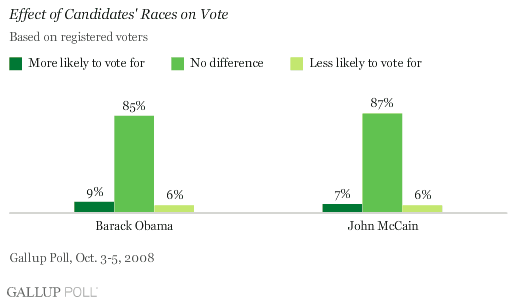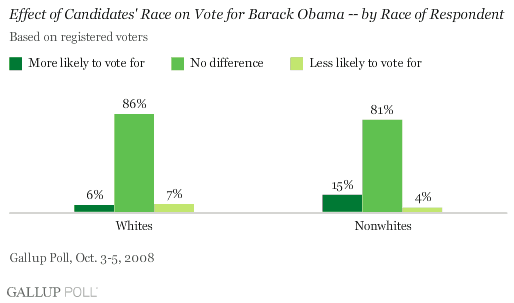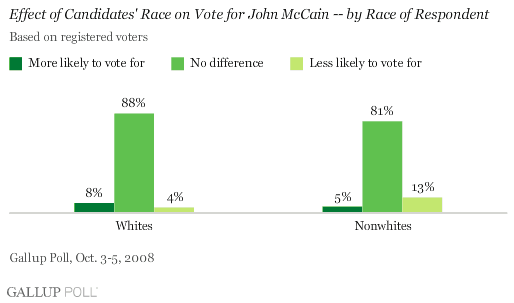PRINCETON, NJ -- While 6% of voters say they are less likely to vote for Barack Obama because of his race, 9% say they are more likely to vote for him, making the impact of his race a neutral to slightly positive factor when all voters' self-reported attitudes are taken into account.

At the same time, 6% of voters say John McCain's race will make them less likely to vote for him, with 7% saying it makes them more likely to vote for him, leading to the same basic conclusion: McCain's race, like Obama's, is on balance neither a plus nor a minus.
These conclusions are based on eight dimensions potentially affecting the vote for both candidates. The dimensions were included in Gallup's Oct. 3-5 poll, and analyzed overall by Gallup's Jeff Jones.
One of the dimensions tested for each candidate was "his race." More specifically, as was true for each of the other seven dimensions, respondents were asked to indicate whether each candidate's race made them more likely, or less likely, to vote for him for president. The data are presented in the charts here.
Eighty-five percent of voters say Obama's race makes no difference, and 87% say McCain's race makes no difference. This makes race the single dimension out of the eight tested that is the least likely to have an impact on the vote.
As noted above, the self-reported impact of race for both Obama and McCain is mixed, with about as many respondents saying race will make them more likely to vote for each candidate as say race will make them less likely to vote for each.
The potential impact of Obama's race on the election has been the more scrutinized this year. These data, taken at face value, show that if anything, his race could be a net plus, in the sense that it makes slightly more voters want to vote for him than not want to vote for him.
There is, as expected, a difference by the race of the respondent in answers to this question.

Among nonwhites in the sample, there is a net difference of 11 percentage points in Obama's favor in terms of the likelihood to vote for him because of his race. Among non-Hispanic whites in the sample, there is a slight net negative for Obama of -1 point.
The impact of McCain's race among nonwhites, on the other hand, is -8 points. Among whites it is +4.

Implications
Much has been written about the impact of race in this year's election, a not surprising fact given that Obama is the first black major-party candidate in U.S. presidential history to gain his party's nomination.
The data analyzed here -- based on voters' self-reports -- show that the impact of Obama's and McCain's races appears to cut both ways. Enough voters, particularly nonwhites, say they are more likely to vote for Obama because of his race to offset the small percentage who say they are less likely to vote for him because of his race. And the same is true in reverse for McCain: the impact of nonwhites' saying his race is a negative is offset by those who say it is a positive.
More specifically, to review perhaps the most important finding in these data, 7% of white voters say Obama's race makes them less likely to vote for him. But 6% of white voters say Obama's race makes them more likely to vote for him. And among nonwhite voters, Obama's race is a significant net plus.
It is important to note that these data are based on self-reports of survey respondents, and may not reflect the unconscious impact of race and/or the willingness of respondents to admit that the race of a candidate affects their voting behavior. But the racial data discussed here were collected in a grid of eight different dimensions, which may have had the impact of downplaying any particular significance to race as a concept that respondents focused on.
In the final reality, it may be impossible to tell exactly what impact the fact that Obama is black and McCain white may have on the outcome of the Nov. 4 election. These results suggest that the large majority of American voters at this point say neither man's race will be a factor in their vote decision. Certainly it's true that a small percentage of white voters say Obama's race will be a negative to them, and a small percentage of nonwhite voters say McCain's race will be a negative. These results are offset by the fact that each man's race is a plus to other voters. Perhaps more importantly, in the context of other candidate dimensions tested in the recent research, race is actually the least important factor tested.
Survey Methods
Results are based on telephone interviews with 926 registered voters, aged 18 and older, conducted Oct. 3-5, 2008. For results based on the total sample of national adults, one can say with 95% confidence that the maximum margin of sampling error is ±4 percentage points.
Interviews are conducted with respondents on land-line telephones (for respondents with a land-line telephone) and cellular phones (for respondents who are cell-phone only).
In addition to sampling error, question wording and practical difficulties in conducting surveys can introduce error or bias into the findings of public opinion polls.
